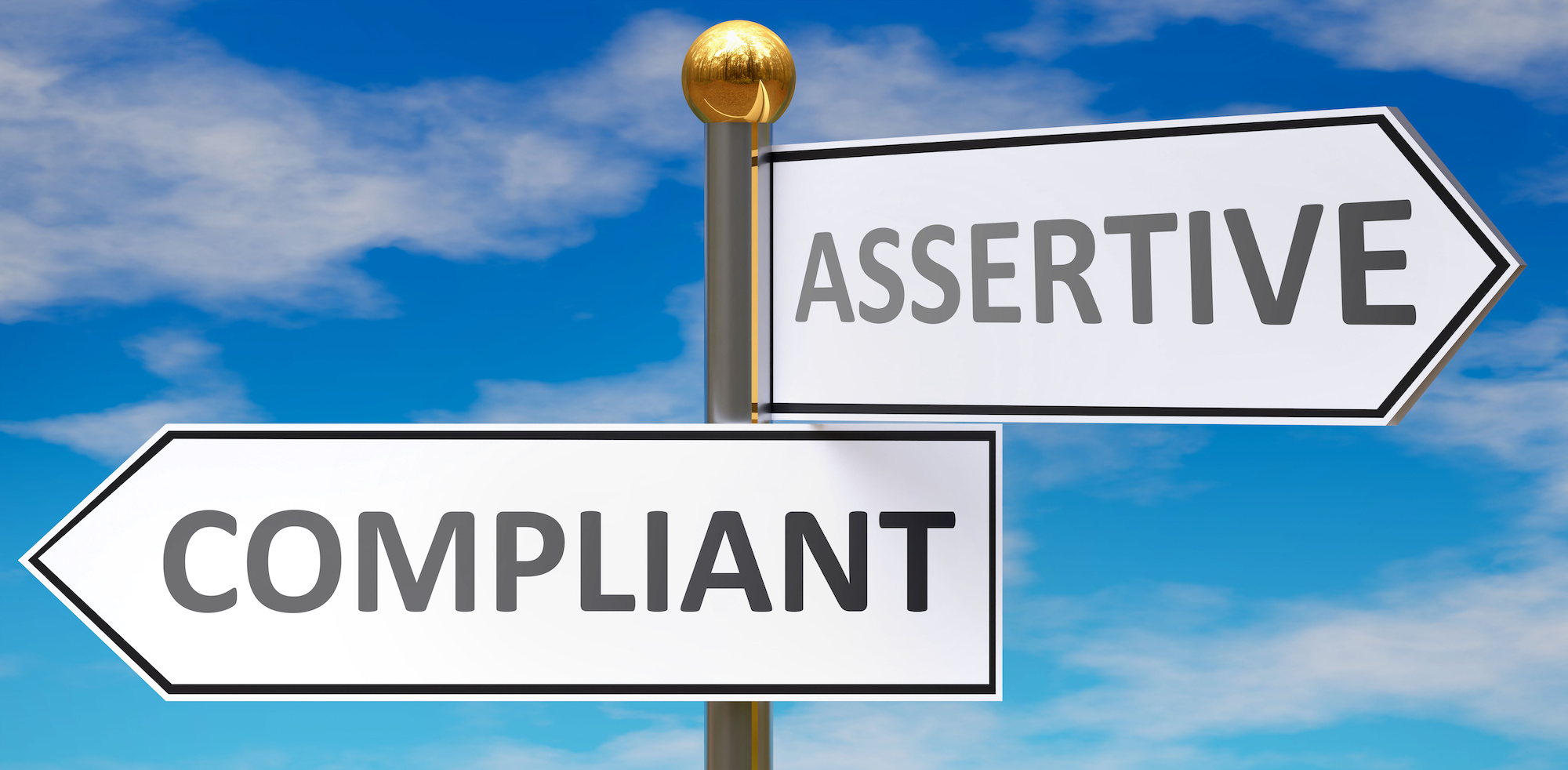What is assertive behavior and how can I practice?
Assertiveness is a core communication skill that can help you effectively express your thoughts and feelings while also respecting others. Being assertive can help you achieve goals, boost self-esteem, navigate a difficult conversation with your roommate, and establish honest, mutual relationships at work and in social settings. It can also help decrease anxiety and stress, especially if you’re someone who has a hard time saying “no” to others.
Developing assertive communication skills can positively impact your life in many ways, but, of course, the communication style doesn’t come naturally to everyone. (Research also suggests that gender can play a role in how assertiveness is perceived, with men more likely to be rewarded for being assertive than women.) Luckily, with time, practice, and patience, anyone can learn to be more assertive.

Table of contents
What is assertive behavior?What are the benefits of being assertive?6 Ways to be more assertiveWhat is assertive behavior?
Being assertive means being able to stand up for your own rights or beliefs in a self-assured manner without assuming a position of dominance over others or submissively accepting the denial of your own needs. Assertive communication requires being forthright about your point of view while still considering the needs of others. It’s ability to express positive and negative thoughts and feelings in an honest, direct, and empathetic way.
Assertive people have the ability to:
Give their opinion and ask for what they want and need.
Disagree respectfully and offer suggestions.
Confront conflict openly and search for a constructive solution that satisfies both sides.
Take responsibility for themselves and their actions without judging or blaming other people.
Say no without feeling guilty.
Being assertive, however, doesn't mean acting in your own interest without considering other people's rights or desires—that’s aggression.
Assertive vs. aggressive behavior
When your communication style is aggressive, you often act according to your own best interests or beliefs without regard for others. Aggressive behavior is motivated by winning: You may come across as selfish, arrogant, pushy, intolerant, overbearing, opinionated, or even a bully. People with an aggressive communication style may get other people to do things their way, but it often leaves others feeling distrustful or disrespected.
Assertive vs. passive behavior
On the flip side, passive behavior can give other people permission to disregard your wants and needs. People with a passive communication style tend to avoid conflict and may seem shy or easygoing, which often comes from a strong need to feel liked by others. Why is this a problem?
When you’re uncomfortable being direct about your thoughts and feelings, or you might end up doing something you don’t want to do in the hopes that you’ll please the other person. This can lead to stress, resentment, anger, feelings of victimization, or a desire for revenge.
Passive behavior often also results in passive-aggressive communication, which involves expressing your internal conflict through negative attitudes or sarcastic complaints about others behind their backs.
What are the benefits of being assertive?
Assertive people tend to be less stressed than people with passive or aggressive communication styles. This is in part because they don't feel threatened or victimized when conflict arises—instead, they feel empowered to find solutions to problems they encounter. In addition to helping you become more self-confident and self-aware, behaving assertively can even strengthen your relationships and earn you respect from your colleagues, friends, roommates, and romantic partners.

6 Ways to be more assertive
Assess your communication style.
The first step in your assertiveness training is assessing your existing communication style. Do you say yes to additional work even when your schedule is jam-packed? Are you quick to blame your roommates for unfinished household chores? By considering which communication style comes closest to yours, you can decide how best to refine or build upon your assertive style.
For example, to work on being less passive and more assertive, try paying closer attention to your feelings and preferences. Notice if you respond with indifference when someone asks what you want. Stop yourself and practice communicating what you're partial to. For instance, if your roommate asks which color couch you’d be happiest with, respond with the option you’d actually prefer.
To work on being less aggressive and more assertive, try letting others speak first—and without interruption. When you disagree with someone’s opinion, try to say so without putting down their point of view. If you find this difficult, you may also want to brush up on communication skills such as active listening.
Use “I” statements.
Using "I" statements lets others know your perspective without sounding accusatory. When communicating with others about your personal preferences, try using simple statements that identify the effect of a specific behavior without attributing blame. If you’d like your roommates to contribute to keeping the house clean, for example, try suggesting: “I feel strongly that we need to establish a household chore chart to maintain the cleanliness of this shared space.”
Be a broken record.
The “broken record” technique involves repeating a request or refusal each time you’re met with resistance. If your boss keeps trying to assign you a new task when you’ve already established you’re too busy, keep restating your original message using the same language—and don't relent until the message is received.
Pay attention to body language.
Communication isn't just verbal—body language can be a helpful tool in conveying confidence, even if you aren't feeling it. During conversation, try to keep an upright posture, make eye contact, and maintain a neutral or positive facial expression. Avoid aggressive body language such as crossed arms or legs.
Practice what you want to say.
Practice communicating what you feel and think by yourself (try in front of the mirror) or with a trusted friend who can give you clear feedback. It may help to write out your thoughts and practice from a script first. If you’re feeling emotional, that’s okay—breathe slowly, keep your voice even and firm, and take your time.
Value yourself.
Assertiveness requires valuing yourself as much as you value others. Remind yourself that your point of view is as important as everyone else's (but not more important, of course). Embrace this opportunity to invest in yourself.
Remember, learning to be more assertive takes time and practice, especially if you’ve developed the habit of silencing your own wants and needs for the majority of your life. Still, assertive communication skills can help you immensely in your adult life, whether that’s in accomplishing career goals—like negotiating a raise or promotion—or establishing healthy relationships with your family, colleagues, roommates, and friends.
Bungalow housing is made for roommates. We handpick homes that are move-in ready and perfect for shared living, and with roommate vetting and compatibility matching, we help you find people you actually want to live with. Find your Bungalow.
Ready to find your next home?
Move-in ready homes and a built-in community so you can feel at home, together — wherever you are.
Suggested articles



